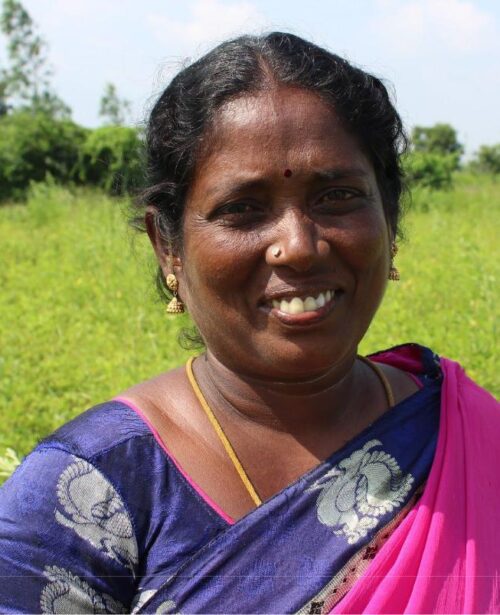Chitra steps into her field of half an acre as she readiesto entertain an interview and winds up a work-related call. She is a busy lady who wears many hats – a mother of two, wife, farmer, trainer, SHG leader, health worker – and dons them truly admirably.
At 43, Chitra is brimming with energy being one of Kudumbam’s lead farmer, building the capacities of fellow farmers on sustainable agriculture at the Kolunji Ecological Farm and Training Center. Despite having to drop out of school at age 14 to work on her parents’ farm and being married at 17, her circumstances did not impede her from gaining and developing experience in leadership with the help of Kudumbam.
Chitra shares she is cultivating different kind of pulses like red gram, millets such as ragi, and groundnut. She uses the method of intercropping which enables farmers to identify drought tolerant crops that they can cultivate on one field. Despiteinfertile soil and being dependenton rain-fed land, she still managesto harvest a good yield. This is one of many techniques she learnedfrom the Kolunji centre that is run by Kudumbam.
Chitra possesses commendable participatory communication skills which she exhibits in her diligent work at organising and mobilising women farmers as Participatory Guarantee System (PGS) groups. For these qualities, she was chosen to be a lead farmer and conduct the course “Trainers Training on Organic Farming from Seed to Harvest” to fellow farmers.
She teaches them to identify agricultural problems on their fields and suggests alternative crops which need less water like pulses and millets, which are not only very nutritious but also pest resistant. Likewise, the intercropping method which she actively promotes proves very helpful to farmers.
After harvesting, Chitra and other farmers sell their crops at the farmers market or trade among each other. In this way, they don’t have to sell through a middle man buying at low rates.
Farmers also focus on non-cash food growing around the farms. Three of five different and very nutritious greens are not available in the market and are considered uncultivated food. Chitra collects them and cooks them at home. Uncultivated food is good for diabetes and knee pain.
Health and wellbeing are concerns that Chitra actively engages in as well. “I’m happy to be able to help improve agricultural practices in my community by promoting agroecology,” she says. Chitra’s cell phone, something her husband forbids her to use a few years ago, rings again signalling work. Asked what else she wishes for in the future, Chitra concludes, “I am now equally working with people who have graduated with university degrees. The only thing separating us is the language, so I want to learn English.”
Chitra is one of the success stories featured in “The Enduring Narratives of Agroecology” by IPAM & PANAP.


